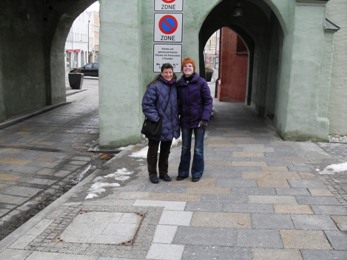
Here’s another blog entry from our guest blogger Andrew who is spending his Year Abroad in Frankfurt, Germany. This time, he is ruminating about a topic that’s very close to our heart: the state of modern language teaching and learning in the UK. Let’s see what he has to say:
Language Learning in the UK
I remember, albeit not vividly, being mocked, quite deservedly, for my appalling attempts at speaking German in front of a Mainz Gymnasium’s class when I was 13 years old and just starting to get to grips with the, at least initially, intimidating grammar and word order of a basic German sentence. If I could remember half of the things I said on that German exchange, I would probably hang my head in shame. Fortunately, those elementary linguistic challenges have since passed, at least I hope so, and I’m left looking at quite a few years of wasted opportunities.
So, why is it that my German exchange was carving her way through a library of English language books in my house and discussing solutions to the world’s problems with my parents, but I could barely ask someone where the toilet is auf Deutsch? Obviously, and to an extent quite rightly, I could point the finger of blame no further than myself, having not bothered to properly learn the German I’d been taught. But, I’ll spare myself and instead ask why foreign language learning is an unpopular and, to some extent, actively discouraged part of the school curriculum in the UK.
“English is the world language and having another language up your sleeve is not going to be much of an asset, when everybody from that country already speaks better English than you could probably ever speak their language.”
Whilst not a word-for-word quote, that was the phrase I heard relatively often in my youth from various teachers and seniors who were certain that their assertions were based on nothing but common sense and having my best interests in mind. Were they right? When I think about what my German has given me in terms of summer courses abroad, meeting countless new foreign friends, including my girlfriend, a chance to really get to know a culture and society foreign to that of my own, greatly increased employability, a foreign job market to look at and the recent developments of a job at Deutsche Bank in Frankfurt for a year, I really have to forcefully disagree. A good friend of mine at home is working for a very well respected recruitment consultancy in London and what is one of the most sought-after skills in all branches of business right now, according to him? Ah, that would be language skills.
When I was sitting in my class of an overwhelming four students for A-Level German, my exasperated language teacher asked me if I would go around the school and give talks during GCSE German lessons to younger pupils, to try and get them interested in language learning and explain to them the advantages of having foreign language skills at A-Level and beyond. Once again, I found myself being somewhat mocked in front of a class, but I hope at least a few of them got the message that it’s something worth pursuing.
I, personally, believe that languages, at least when I was at school, were taught, at the best of times, in such a mundane and soul-destroying manner that it didn’t really surprise me when everyone quit them at the earliest opportunity. This is not a criticism of the individual teachers, at all. On the contrary, my teachers were excellent and without them I wouldn’t have got the exam results I sought. It was, instead, the rigid specification of the exam boards that paralysed the language staff from making their lessons more exciting. What I, to this day, struggle to understand is why the overwhelming advantages of foreign language learning aren’t explained, drilled in even, in all their detail, to the pupils learning, or thinking of learning, a foreign language at school. I would show to the pupils, continuously, countless examples of how far people can go and have gone with their language skills. I would show them what doors it opens up and what doors it certainly doesn’t close. I’m not a psychology expert, but surely if people can see the “light at the end of the tunnel” of learning a language, as opposed to the intimidating grammar tables and 40 year old text books, then a change in attitude might slowly start to evolve. Saying that, I don’t know what it’s like now in British schools.
On the German pupils’ front, I have to take my hat off to them. Of course, there will be some who speak English poorly, but on the whole, I have been nothing but impressed by how well they seem to have been able to grasp the English language. I’m sure the continuous exposure to the English language through media and music etc plays a large role, but there’s an attitude there nonetheless that’s very positive.
I haven’t looked at any current government initiatives or statistics concerning language learning in British schools, but I have been told that German IBML has gone up quite a lot in popularity this year (overtaken the Spanish IBML even??). Let’s get the champagne out and look at that as a sign of good things to come….
Andrew
What do YOU think? Do you agree with Andrew’s analysis? Have you had similar experiences? Talk to us!










 The year abroad – the challenging and exciting year where modern foreign languages students are faced with the prospect of living in another country such as France, Germany or Spain. At Aston University, students are given the option of completing a teaching assistantship at a school, studying at a partner university or completing a work placement. The last option however, strangely appears to have been one of the least popular options, at least during the current academic year and the academic year 2009-2010 when I completed my year abroad at a translation agency in Bavaria, Germany, from July 2009-July 2010. This decline was something that greatly intrigued me upon my return to the UK as I had had the time of my life, made some amazing friends and secured a job all in one year. So, hoping to get honest opinions from languages students in the UK who either had completed or who were in the process of completing a year abroad as a part of their degree programme, I created a survey during September 2010. This survey asked them detailed questions about their attitudes to work placements in a foreign country, their preferences, thoughts and concerns.
The year abroad – the challenging and exciting year where modern foreign languages students are faced with the prospect of living in another country such as France, Germany or Spain. At Aston University, students are given the option of completing a teaching assistantship at a school, studying at a partner university or completing a work placement. The last option however, strangely appears to have been one of the least popular options, at least during the current academic year and the academic year 2009-2010 when I completed my year abroad at a translation agency in Bavaria, Germany, from July 2009-July 2010. This decline was something that greatly intrigued me upon my return to the UK as I had had the time of my life, made some amazing friends and secured a job all in one year. So, hoping to get honest opinions from languages students in the UK who either had completed or who were in the process of completing a year abroad as a part of their degree programme, I created a survey during September 2010. This survey asked them detailed questions about their attitudes to work placements in a foreign country, their preferences, thoughts and concerns.